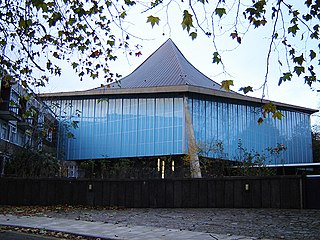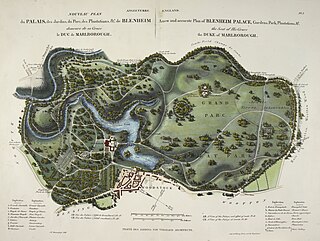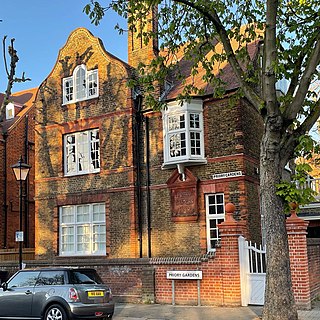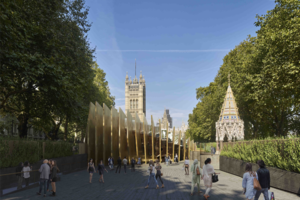
The National Trust is a charity and membership organisation for heritage conservation in England, Wales and Northern Ireland. In Scotland, there is the separate and independent National Trust for Scotland.

English Heritage is a charity that manages over 400 historic monuments, buildings and places. These include prehistoric sites, medieval castles, Roman forts and country houses.

Cadw is the historic environment service of the Welsh Government and part of the Tourism and Culture group. Cadw works to protect the historic buildings and structures, the landscapes and heritage sites of Wales, to make them available for the public to visit, enjoy, and understand their significance. Cadw manages 127 state-owned properties and sites. It arranges events at its managed properties, provides lectures and teaching sessions, offers heritage walks, and hosts an online shop. Members of the public can become members of Cadw to gain membership privileges.

In the United Kingdom, a listed building is a structure of particular architectural and/or historic interest deserving of special protection. Such buildings are placed on one of the four statutory lists maintained by Historic England in England, Historic Environment Scotland in Scotland, Cadw in Wales, and the Northern Ireland Environment Agency in Northern Ireland. The term has also been used in the Republic of Ireland, where buildings are protected under the Planning and Development Act 2000, although the statutory term in Ireland is "protected structure".
The Register of Historic Parks and Gardens of Special Historic Interest in England provides a listing and classification system for historic parks and gardens similar to that used for listed buildings. The register was set up by Historic England under the provisions of the National Heritage Act 1983. Over 1,600 sites are listed, ranging from the grounds of large stately homes to small domestic gardens, as well other designed landscapes such as town squares, public parks and cemeteries. The register is published on the National Heritage List for England alongside other national heritage designations.

The Commonwealth Education Trust was a registered charity established in 2007 as the successor trust to the Commonwealth Institute. The trust focuses on primary and secondary education and the training of teachers and invests on educational products and services to achieve both a beneficial and a financial reward to fund future charitable initiatives.

Historic garden conservation is a specialised type of historic preservation and conservation or restoration concerned with historical and landmark gardens and designed landscapes.

The Georgian Group is a British charity, and the national authority on Georgian architecture built between 1700 and 1837 in England and Wales. As one of the National Amenity Societies, The Georgian Group is a statutory consultee on alterations to listed buildings, and by law must be notified of any work to a relevant listed building which involves any element of demolition.

The Nautical Archaeology Society (NAS) is a charity registered in England and Wales and in Scotland and is a company limited by guarantee.

The Victorian Society is a UK charity and amenity society that campaigns to preserve and promote interest in Victorian and Edwardian architecture and heritage built between 1837 and 1914 in England and Wales. As a statutory consultee, by law it must be notified of any work to a listed building which involves any element of demolition or structural alteration.

Span Developments Limited was a British property development company formed in the late 1950s by Geoffrey Townsend working in long and close partnership with Eric Lyons as consultant architect. During its most successful period in the 1960s, Span built over 2,000 homes in London, Surrey, Kent and East Sussex – mainly two- and three-bedroom single-family homes and apartment buildings.
The British Institute of Organ Studies (BIOS) is a British organisation and registered charity which aims to promote study and appreciation of all aspects of the pipe organ. Further, it acts as a lobbying body to raise awareness of organ issues with appropriate statutory bodies. Membership is open to all.

The Royal Parks of London are lands that were originally used for the recreation, mostly hunting, of the royal family. They are part of the hereditary possessions of The Crown, now managed by The Royal Parks Limited, a charity which manages eight royal parks and certain other areas of parkland in London. The Royal Parks charity was created as a company limited by guarantee in March 2017 and officially launched in July 2017. Its chief executive is Andrew Scattergood.
Save Britain's Heritage is a British charity, created in 1975 by a group of journalists, historians, architects, and planners to campaign publicly for endangered historic buildings. It is also active on the broader issues of preservation policy. SAVE is a registered charity governed by a board of trustees.
Historic England is an executive non-departmental public body of the British Government sponsored by the Department for Culture, Media and Sport. It is tasked with protecting the historic environment of England by preserving and listing historic buildings, scheduling ancient monuments, registering historic parks and gardens and by advising central and local government.

The Clwyd-Powys Archaeological Trust is an educational charity which was established in 1975. Its objective is ‘to advance the education of the public in archaeology’. CPAT is one of four Welsh Archaeological Trusts (WATs) which work to help protect, record and interpret all aspects of the historic environment. This includes providing advice to local authorities on archaeology and planning, undertaking archaeological projects for private- and public-sector clients, and delivering a programme of community archaeology events and activities.
Registered battlefields in the UK are battlefields recognised as having specific historic or cultural significance. They are recognised as such by conservationist organisations for a variety of reasons, including protecting them from development that may threaten historic buildings, items, or topography. The history relating to them is often hard to unravel, as there is often little to see above ground and the historical record is often biased in favour of the victors. The UK has many historic battlefield sites, some of which have legal protection through heritage protection legislation whilst others are protected through landscape legislation. More recently, some archaeologists prefer the term "site of conflict" to "battlefield", because of the difficulty in defining the geographical extent of a site.
In England and Wales, an amenity society is an organisation which monitors planning and development.

A UK Holocaust Memorial memorial and learning centre was first proposed in 2015 to preserve the testimony of British Holocaust survivors and concentration camp liberators and to honour Jewish and other victims of Nazi persecution, including Roma, homosexual, and disabled people.
The Welsh Historic Gardens Trust is a charity and membership organisation for heritage conservation. Established in 1989, the trust exists to support the conservation of historic parks and gardens in Wales.













